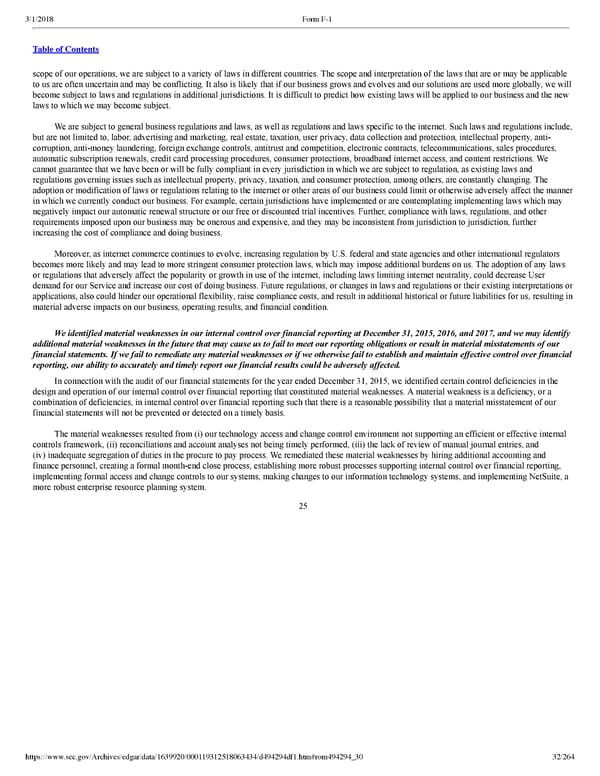32/264 scope of our operations, we are subject to a variety of laws in different countries. The scope and interpretation of the laws that are or may be applicable to us are often uncertain and may be conflicting. It also is likely that if our business grows and evolves and our solutions are used more globally, we will become subject to laws and regulations in additional jurisdictions. It is difficult to predict how existing laws will be applied to our business and the new laws to which we may become subject. We are subject to general business regulations and laws, as well as regulations and laws specific to the internet. Such laws and regulations include, but are not limited to, labor, advertising and marketing, real estate, taxation, user privacy, data collection and protection, intellectual property, anti corruption, antimoney laundering, foreign exchange controls, antitrust and competition, electronic contracts, telecommunications, sales procedures, automatic subscription renewals, credit card processing procedures, consumer protections, broadband internet access, and content restrictions. We cannot guarantee that we have been or will be fully compliant in every jurisdiction in which we are subject to regulation, as existing laws and regulations governing issues such as intellectual property, privacy, taxation, and consumer protection, among others, are constantly changing. The adoption or modification of laws or regulations relating to the internet or other areas of our business could limit or otherwise adversely affect the manner in which we currently conduct our business. For example, certain jurisdictions have implemented or are contemplating implementing laws which may negatively impact our automatic renewal structure or our free or discounted trial incentives. Further, compliance with laws, regulations, and other requirements imposed upon our business may be onerous and expensive, and they may be inconsistent from jurisdiction to jurisdiction, further increasing the cost of compliance and doing business. Moreover, as internet commerce continues to evolve, increasing regulation by U.S. federal and state agencies and other international regulators becomes more likely and may lead to more stringent consumer protection laws, which may impose additional burdens on us. The adoption of any laws or regulations that adversely affect the popularity or growth in use of the internet, including laws limiting internet neutrality, could decrease User demand for our Service and increase our cost of doing business. Future regulations, or changes in laws and regulations or their existing interpretations or applications, also could hinder our operational flexibility, raise compliance costs, and result in additional historical or future liabilities for us, resulting in material adverse impacts on our business, operating results, and financial condition. We identified material weaknesses in our internal control over financial reporting at December 31, 2015, 2016, and 2017, and we may identify additional material weaknesses in the future that may cause us to fail to meet our reporting obligations or result in material misstatements of our financial statements. If we fail to remediate any material weaknesses or if we otherwise fail to establish and maintain effective control over financial reporting, our ability to accurately and timely report our financial results could be adversely affected. In connection with the audit of our financial statements for the year ended December 31, 2015, we identified certain control deficiencies in the design and operation of our internal control over financial reporting that constituted material weaknesses. A material weakness is a deficiency, or a combination of deficiencies, in internal control over financial reporting such that there is a reasonable possibility that a material misstatement of our financial statements will not be prevented or detected on a timely basis. The material weaknesses resulted from (i) our technology access and change control environment not supporting an efficient or effective internal controls framework, (ii) reconciliations and account analyses not being timely performed, (iii) the lack of review of manual journal entries, and (iv) inadequate segregation of duties in the procure to pay process. We remediated these material weaknesses by hiring additional accounting and finance personnel, creating a formal monthend close process, establishing more robust processes supporting internal control over financial reporting, implementing formal access and change controls to our systems, making changes to our information technology systems, and implementing NetSuite, a more robust enterprise resource planning system. 25
 Spotify F1 | Interactive Prospectus Page 31 Page 33
Spotify F1 | Interactive Prospectus Page 31 Page 33